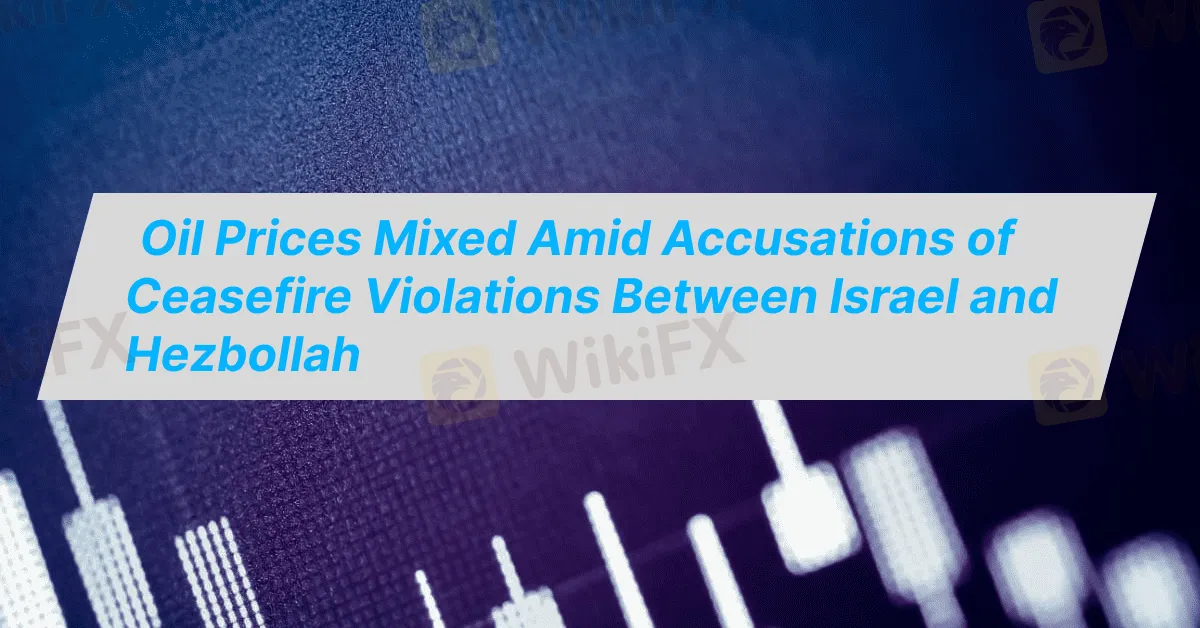简体中文
繁體中文
English
Pусский
日本語
ภาษาไทย
Tiếng Việt
Bahasa Indonesia
Español
हिन्दी
Filippiiniläinen
Français
Deutsch
Português
Türkçe
한국어
العربية
Oil Prices Mixed Amid Accusations of Ceasefire Violations Between Israel and Hezbollah
Abstract:According to the report, Oil prices were mixed on Friday, with concerns over potential supply risks resurfacing following accusations from both Israel and Hezbollah regarding violations of their ceasefire. Investors are also awaiting a decision on OPEC+ output policy, as a delay to the group’s meeting adds uncertainty to the market.

According to the report, Oil prices were mixed on Friday, with concerns over potential supply risks resurfacing following accusations from both Israel and Hezbollah regarding violations of their ceasefire. Investors are also awaiting a decision on OPEC+ output policy, as a delay to the groups meeting adds uncertainty to the market.
By 02:32 GMT, Brent crude futures had dropped 7 cents, or 0.1%, to $73.21 per barrel. In contrast, U.S. West Texas Intermediate (WTI) crude futures rose by 38 cents, or 0.55%, to $69.10 compared to Wednesdays close.
Market trading was subdued due to the Thanksgiving holiday on Thursday, which resulted in the closure of U.S. financial markets.
On Thursday, Israel and Hezbollah exchanged accusations over alleged violations of their ceasefire, which had come into effect the day before. Initially, the ceasefire had appeared to alleviate fears of broader conflict and potential disruptions to oil supplies in the region. Despite these tensions, oil flows from the Middle East have remained largely unaffected by the ongoing conflicts between Israel and Hezbollah in Lebanon, as well as Hamas in Gaza.
Meanwhile, Russia launched a second attack this month on Ukrainian energy facilities, raising concerns over the risk of retaliatory actions that could impact Russian oil supplies. ANZ analysts noted that the escalating situation could disrupt oil production in the region.
Adding to the uncertainty, OPEC+—the coalition of OPEC members and their allies, including Russia—delayed its upcoming policy meeting to December 5th from the previously scheduled December 1st to avoid a conflict with another major event. Market expectations are that OPEC+ will extend its production cuts during the meeting.
In Iran, the country informed the United Nations nuclear watchdog of plans to install more than 6,000 additional uranium-enriching centrifuges at its nuclear facilities. Goldman Sachs analysts warned that if Western powers ramp up sanctions enforcement on Iranian oil exports, the country could see a reduction in crude oil production by up to 1 million barrels per day in the first half of next year.

Disclaimer:
The views in this article only represent the author's personal views, and do not constitute investment advice on this platform. This platform does not guarantee the accuracy, completeness and timeliness of the information in the article, and will not be liable for any loss caused by the use of or reliance on the information in the article.
Read more

Dark Side of AETOS: They Don’t Want You to Know
AETOS is an Australia-based broker. All over the internet, you will find positive reviews about this broker, but no one is talking about the risks involved with AETOS. However, we have exposed the hidden risks associated with AETOS

Contemplating Investments in Quotex? Abandon Your Plan Before You Lose All Your Funds
Have you received calls from Quotex executives claiming to offer you returns of over 50% per month? Do you face both deposit and withdrawal issues at this company? Or have you faced a complete scam trading with this forex broker? You're not alone. Here is the exposure story.

15 Brokers FCA Says "Are Operating Illegally" Beware!
If a reputable regulator issues a warning about unlicensed brokers, it's important to take it seriously — whether you're a trader or an investor. Here is a list you can check out- be cautious and avoid getting involved with these scam brokers.

Scam Alert: Revealing Top Four Forex Scam Tactics Employed to Dupe Investors
Gaining and losing on forex trades is normal, but not scams that siphon out millions in no time! In this article, we will reveal forex scam tactics. Read on!
WikiFX Broker
Latest News
Lead Prices Remain in the Doldrums Despite Seasonal Expectations
Myanmar Tin Ore Shipments from Wa Region Set to Resume
Major U.S. Banks Plan Stablecoin Launch Amid Crypto Regulations
SHFE Tin Prices Stabilise in the Night Session After Initial Decline
Treasury yields rise as Trump denies plans to fire Fed Chair Powell
Forex Trading Simulator vs Demo Account: Key Differences
Different Forex Market Regulators But One Common Goal - Investor Safety
Do You Really Understand Your Trading Costs?
5 Reasons Why Some Traders Choose XChief
Harsh Truths About ATC Brokers Every Trader Must Know
Currency Calculator


